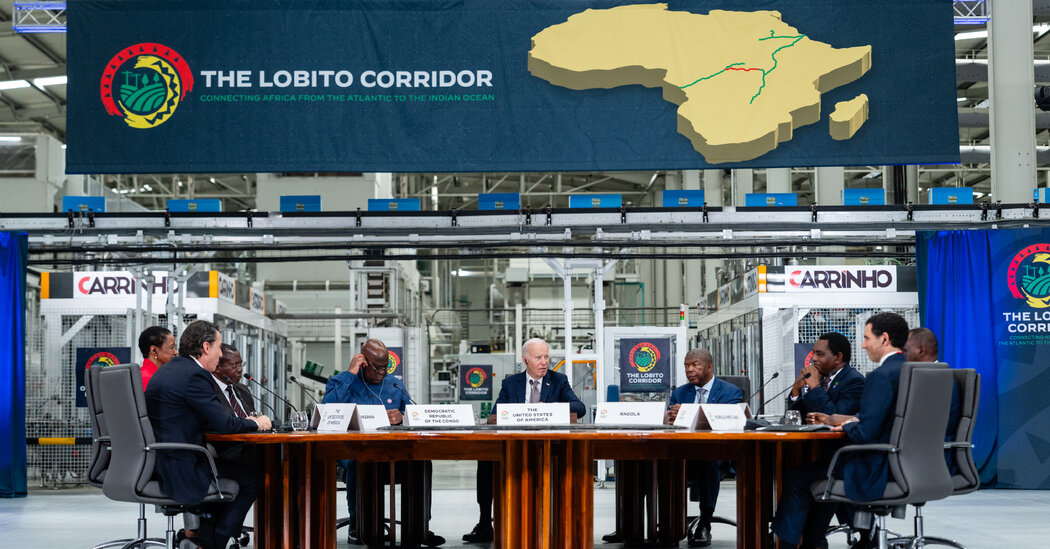An 800-mile rail corridor stretching from Angola’s northern border to the Atlantic Ocean was former President Joseph R. Biden Jr.’s signature project in Africa, meant to counter Chinese influence and reshape America’s engagement with the continent.
When President Trump came into office this year, he quickly moved to dismantle decades of American aid to Africa, raising fears that the United States was pulling back from its commitments to the continent. The future of America’s involvement in the rail project was an open question.
But this week, the acting U.S. ambassador in Angola, James Story, gave the first indication that the Trump administration was on board with the project, the Lobito Corridor, which is expected to improve America’s access to minerals like cobalt and copper that are critical to the clean-energy transition.
Mr. Story, who arrived in Angola last October, is leading a delegation of more than a dozen mostly Western envoys on a three-day publicity tour along the rail line, including visits with local politicians and to business ventures.
As Mr. Trump continues to craft his own Africa team, the tour offered clues to how he plans to shape his policy on the continent, and the ways in which it may align with or depart from Mr. Biden’s approach.
“The Trump administration is all about making business to favor the United States,” said Osvaldo Mboco, a professor of international relations at the Technical University of Angola in the capital, Luanda.
Although no Trump officials from Washington came on the tour, Mr. Story said the administration supported the effort. The purpose, he added, was to show international solidarity for the project, look for investment opportunities and make clear that the United States and its Western allies are not walking away from the project.
The railway was initially completed in 1931, running from Angola’s border with the Democratic Republic of Congo — home to the world’s largest cobalt reserves — to the port city of Lobito on the west coast. China funded the rehabilitation of the line a little more than a decade ago.
Under the Biden administration, the United States committed about $4 billion to various projects along the corridor, including refurbishing the rail line, and developing mining and agricultural projects.
Mr. Biden pitched the corridor as part of America’s new approach to engaging with Africa — focusing more on commercial partnerships, rather than just aid and extracting natural resources. He saw it as an answer to China’s longtime engagement with African nations, which has resulted in the construction of new cities, airports, highways and shopping centers.
Biden administration officials said the railway would entice companies to build manufacturing plants nearby so they could transport goods, and would give local farmers a way to ship their produce.
It is unclear if the Trump administration will champion those broader economic benefits of the rail line or focus squarely on increasing American access to minerals.
“Is this just about the refurbishment of a rail or is it about investing in telecoms and alternative energy sources and food security,” said Judd Devermont, who was one of Mr. Biden’s top advisers on Africa.
The project’s ambitions already have been affected by some of Mr. Trump’s policies. An initiative meant to teach women better farming techniques, with the hope of increasing agricultural production along the rail line, was shut down after Mr. Trump defunded the United States Agency for International Development.
There are some early indications, however, that the Trump administration might be looking for business investments in Africa.
Ben Black, the president’s nominee to run the U.S. International Development Finance Corporation, which lends billions to overseas projects and has been one of America’s main funders along the Lobito Corridor, has said he wants to take an “investment-driven” approach to overseas spending.
Adam Cortese, the chief executive of Sun Africa, an American solar energy company with U.S. government-backed projects along the corridor and in Nigeria, said his engagements with Trump officials had been encouraging. The officials have expressed a desire to invest in developing Africa’s energy infrastructure, he said.
“They support production as long as it has to do with U.S. companies,” he said, adding that his company’s primary competitors in Africa are Chinese state-owned entities. “There certainly seems to be a lot of support for increasing U.S. competition with China.”
Although Mr. Trump has not explicitly expressed support for the Lobito Corridor project, Ricardo Viegas D’Abreu, Angola’s transportation minister, said this week’s diplomatic mission was a positive signal. Angola’s president has said that strengthening economic ties with the United States is essential to help his oil-rich country grow and diversify its economy.
“We feel that no major disruption has happened even on the transition to this new administration,” Mr. D’Abreu said of the progress on the Lobito project.
Ultimately, the benefit that Angola and other African nations get from doing business with Mr. Trump will come down to how those countries position themselves, said Mr. Mboco, the international relations professor. They will need to strike deals that include U.S. investment in manufacturing in Africa, rather than allowing Americans to just extract natural resources, he said.
“Africa needs to stop being the poor family member,” Mr. Mboco said.
